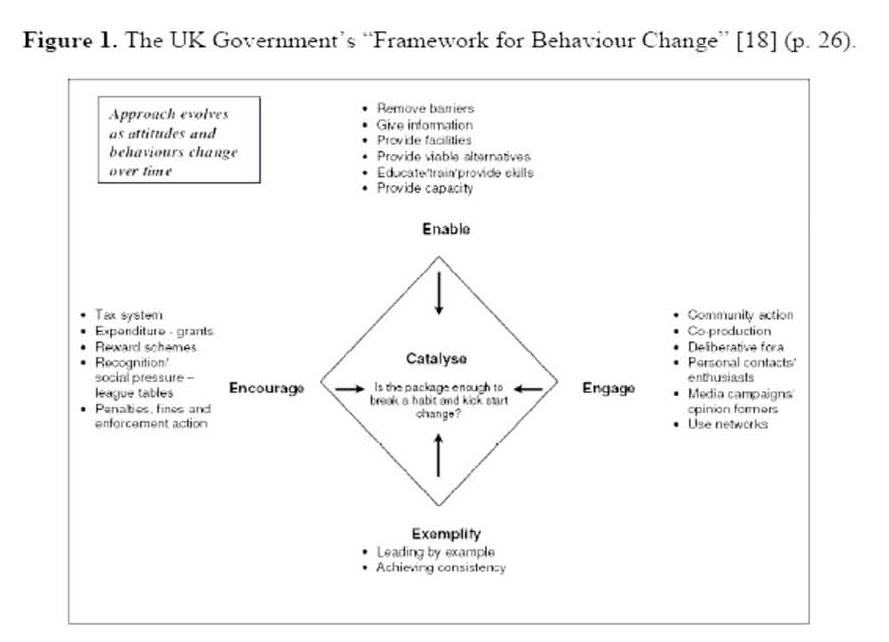The British government is approaching its commitment to reduce greenhouse gas emissions by 80%, with a focus on ways to bring about behaviour change, in addition to the more traditional reach for a technological fix. Today’s review article summarizes the background behind the policy and the results of polling.

Key Quotes:
“Government interventions on the demand side of consumption have increasingly involved attempts to obtain greater traction with the values, attitudes and beliefs of citizens in relation to climate change and also in terms of influencing consumer behaviour at an individual level. “
“44% of all emissions are by individual households, most of which comes from four transactions: electricity and gas in our homes, and car and air travel”
“The practical difficulties of reaching increasingly stringent UK targets for CO2 emission reductions have encouraged policy-makers to embrace and promote “bottom-up” solutions in order to address, for example, patterns of consumption and lifestyles such as those associated with travel, eating habits, leisure practices and patterns of living”
“a growing concern with environmental degradation can be traced to the significance of living in a “post-scarcity society”.. Most ecological issues, including global climate change, are not to do with scarcity of resources, but with the profligate use of them. Traffic congestion and pollution are good examples. “
“four dimensions of the diamond model:
Enable. - be as an information provider in order to encourage the individual consumer to make more informed choices in their purchasing habits.
Engage- awareness raising campaigns which are embedded at a local level are far more likely to resonate with individuals if led by local authorities
Encourage- Various congestion charge schemes had also been developed in order to encourage less “unnecessary” journeys by private car.
Exemplify- the UK Government set a longer-term target of an 80 per cent reduction in emissions by 2050; punctuated by a series of interim targets by which political leaders will be accountable themselves.
“The issue of convenience was considered to be an important factor in participants‘ decisions with regard to both domestic energy use and purchase of appliances—almost always overriding potential environmental consequences”
Related articles
- Climate change a threat to human security (chimalaya.org)
- Climate change disasters could be predicted (eurekalert.org)
- Global Warming Items: "Climate change is the greatest market failure the world has ever seen." (brain4biz.wordpress.com)
- Al Gore Condemns Obama for Lack of Action on Climate Change (redantliberationarmy.wordpress.com)
- UN off base on climate change (chimalaya.org)
- Energy-saving is not always saving energy (guardian.co.uk)
- Climate change is bad for you (room4truth.com)
- Can cities lead the way in cutting greenhouse gas emissions? [del.icio.us] (guardian.co.uk)
- Harper government receives diplomatic spanking over climate policies (canada.com)
- World off course on climate; renewables vital (chimalaya.org)
- Why climate activists should focus on threats to people's lives (liberalconspiracy.org)

No comments:
Post a Comment